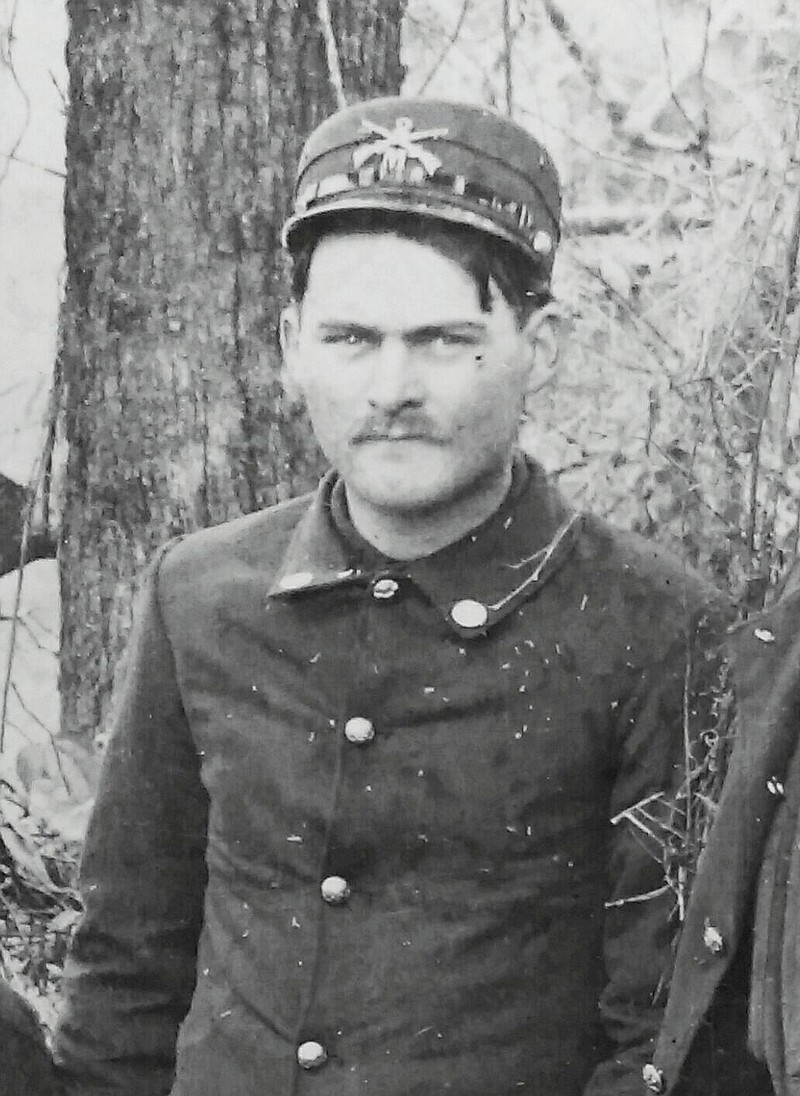Hundreds of marble headstones painstakingly aligned in rows throughout the historic Jefferson City National Cemetery serve as a testimony of the wars in which our nation has been involved and the brave individuals who participated in these conflicts. However, nearly hidden among the scores of timeworn markers is one inscribed with the name James H. Debo, a veteran of an essentially forgotten war.
The veteran's tombstone might simply earn a passing glimpse by a visitor to the cemetery, but Debo's legacy of service in a volunteer Missouri regiment begs further investigation and helps to highlight the involvement of the state and nation in the historic event known as the Spanish-American War.
Born in Muskogee, Illinois, on Aug. 25, 1876, Debo was living in the Texas County community of Houston, Missouri, when he and several local men made the decision to enlist in Company M, Second Missouri Volunteer Infantry located in Springfield, Missouri.
As noted in a souvenir booklet for the 49th annual encampment of the United Spanish War Veterans held in Kansas City, Missouri, in 1947, the United States "tried to intervene in a friendly fashion" to advocate for the freedom of Cuba from what was deemed oppressive conditions imposed by the Spanish government.
The booklet went on to state that "early in the year 1898 the battleship Maine was sent into Havana harbor as a friendly mission to that end. But on Feb. 15, 1898, a terrible explosion rent the Maine amidships, with great loss of life among our sailors."
"The History of the Missouri National Guard," published in November 1934, noted, "War was declared by Congress by resolution of April 1st 1898, and on April 22nd the President (McKinley) called for 126,000 volunteers. Missouri's allotment was placed at 5,000."
The state would eventually furnish six regiments of infantry and one battery of light artillery for the Spanish-American War. The Second Regiment, of which James Debo became a member, was initially comprised of 10 companies located in Carthage, Butler, Lamar, Sedalia, Pierce City, Clinton, Joplin, Nevada, Springfield and Jefferson City.
The president's call for additional volunteers resulted in the regiment increasing from 10 companies to 12 with additional companies added in Springfield and Sedalia. Rosters maintained by the Missouri State Archives indicate Debo enlisted in Second Regiment's Company M - the second of the two Springfield companies - on May 4, 1898.
Reflecting on the community support for those departing for service, the Houston Herald, in its June 26, 1930, edition, ran an editorial highlighting an important event more than three decades past. "We remember when the call came for the Houston boys to mobilize in Springfield; we remember that practically every man, woman and child in the city of Houston was out wading in the mud to see the boys off to war."
A commemorative booklet printed after the war for the soldiers of the Second Missouri Volunteer Infantry, noted, "Pursuant to permission from Governor Stephens of Missouri, the regiment mobilized and rendezvoused at Jefferson Barracks, near St. Louis, Mo., May 6, 1898, and was mustered into the service of Uncle Sam on May 12th, having been reduced to the minimum strength of 1,031 officers and men."
Debo and his fellow soldiers of the Second Missouri soon departed to set up camp in the former Civil War battlefield that had become Chickamauga Park, Georgia, arriving on May 20, 1898. The next several months involved training of the new recruits in military drills and target practice with Springfield rifles, which were later replaced with the newer Krag-Jorgesen rifles.
While the Rough Riders and other military units were involved in pitched combat against Spanish forces in Cuba, the Second Missouri was fighting its own battles with several afflictions to include "typhoid fever and malarial fevers," resulting from the filthy conditions of the camp.
The call to deploy to Cuba never arrived and an armistice ending the Spanish-American War was signed on Aug. 12, 1898. Debo and the soldiers of the Second Regiment later moved camps, spending time in Kentucky and later relocating to Albany, Georgia, where they were mustered out of the service on March 3, 1899.
Returning home to Missouri, Debo was married to Maggie Saila on Jan. 4, 1901, in Springfield. Years later, when the Spanish-American War veteran was widowed after the passing of his wife, he lived with family in Nebraska before settling in Fulton, Missouri, where he was employed as a pharmacist. He died April 29, 1955, and was laid to rest in the Jefferson City National Cemetery.
Without children to pass down his legacy, Debo could easily become one of many forgotten soldiers who served in a war sandwiched between the more prominent Civil War and World War I. But, as was noted by Chaplain Hamilton during the national encampment of Spanish-American War veterans held in 1947, it is the responsibility of the individual to live a life worthy of remembrance.
"We don't want to be forgotten. So many pass each year," Hamilton said. "As my eyes sweep over this audience, I just wonder how many of us will go. That's the nature of things it comes, and there is no use being worried about it."
Sagely, he added, "The thing to do my comrades, is to so live and labor that we will be well prepared to depart from this life and into the next, and we will not be forgotten. They will keep our graves decorated."
He stressed, "We shall not be forgotten."
Jeremy P. Amick writes on behalf of the Silver Star Families of America.

